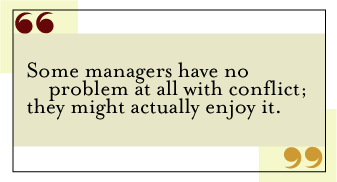Conflict is an inevitable and unavoidable part of business. Indeed, managers confront conflicts daily, whether they're dealing with irate customers, poor performance, or a host of other difficult matters.
Of course, not all forms of conflict are bad. Creative tension, for instance, can spur innovation. But other types of conflict drain productivity. Managers and employees who have a tough time dealing with confrontation can get knocked off balance or become distracted if they know an argument or intense disagreement is looming on the horizon. A conflict can also send them into a tailspin after it occurs.
 |
Some managers, however, have no problem at all with conflict; they might actually enjoy it. The problem is that although they may relish battles and arguments, their employees may not -- and some may spiral downward and lose focus as a result of their bosses' confrontational style.
In either case, mastering the art of dealing with conflict can help employees stay on track and avoid the "conflict tailspin." So what is the best approach? It depends. The most effective method taps your innate talents and is based on who you naturally are. Let's talk about how you can apply your talents to conflict.
Leveraging your innate talents
The Clifton StrengthsFinder -- a Web-based talent assessment -- measures people's talent in 34 themes and reveals their five most dominant, or Signature, themes. It helps people understand that they have the greatest potential to grow and succeed by leveraging their areas of greatest talent. And the better that people understand their talents, the more effectively they can take control of the situations with which they are confronted.
Because human beings are so different, there is no perfect "one-size-fits-all" approach to using talents to handle conflict. To give you a better feel for how it can work, let's look at how some real people have learned to handle conflict more effectively after learning the results of their Clifton StrengthsFinder assessment.
First, let's talk about Jen, a sales manager who is not bothered at all by conflict. Jen is a take-charge individual, so it's not surprising that her top talent theme is Command. People with exceptional Command have a natural ability to be more comfortable in the face of resistance. Her issue, then, is not a discomfort with conflict, but rather the impact that her blunt approach has on other people who are in conflict with her. And these people most often end up being her salespeople.
In a recent team meeting, Jen heard very clearly from her salespeople that she has a tendency to escalate discussions into arguments. After a lengthy discussion -- and, of course, some arguing -- Jen realized that this was true. She also understood that she needed to become more sophisticated about how to apply her talents in these situations.
For Jen, this meant calling on another one of her Signature Themes: Input. She loves to ask questions and gather information. After the meeting with her team, when problems surfaced, Jen began asking her salespeople a lot of questions. She quickly realized that when she did this before making assumptions and jumping to conclusions, problems rarely became conflicts. Jen says there are times when she needs to "make a call and resolve an issue." But now, her salespeople feel like they are included and valued because she is drawing on her Input talents to get their, well, input.
Now let's discuss Jared, one of Jen's salespeople. The prospect of arguing with another person or facing a tough issue makes him incredibly uncomfortable. He typically retreats into avoidance mode until things escalate to the point when other people have to get involved. Jared realized this was a real issue and addressed it with a strengths performance coach.
The coach noted that Jared's top two Clifton StrengthsFinder themes are Individualization and Strategic. Individualization talents lead people to appreciate the uniqueness of others, and people with a lot of Strategic talent tend to see alternate routes to a given situation. After some in-depth discussions with the coach, Jared realized that when he needed to confront someone, he could tap his Individualization talents to see the problem from the other person's perspective while using his Strategic talents to think through alternatives for solving the conflict.
Jared began to look at these scenarios less as potential conflicts and more like problems to be solved. He describes it this way: "The main thing I realized is that I was usually blowing these situations out of proportion. They rarely turned into real conflicts when I looked at them a little bit differently."
Jared admits that if a really "hairy" issue comes up, he can still get pretty nervous. Then he heeds a key piece of advice from his coach: Partner with someone who has complementary talents. "I ask my manager to help me out," Jared says. And given that his manager, Jen, has no problem embracing conflict, theirs is probably an effective partnership indeed.